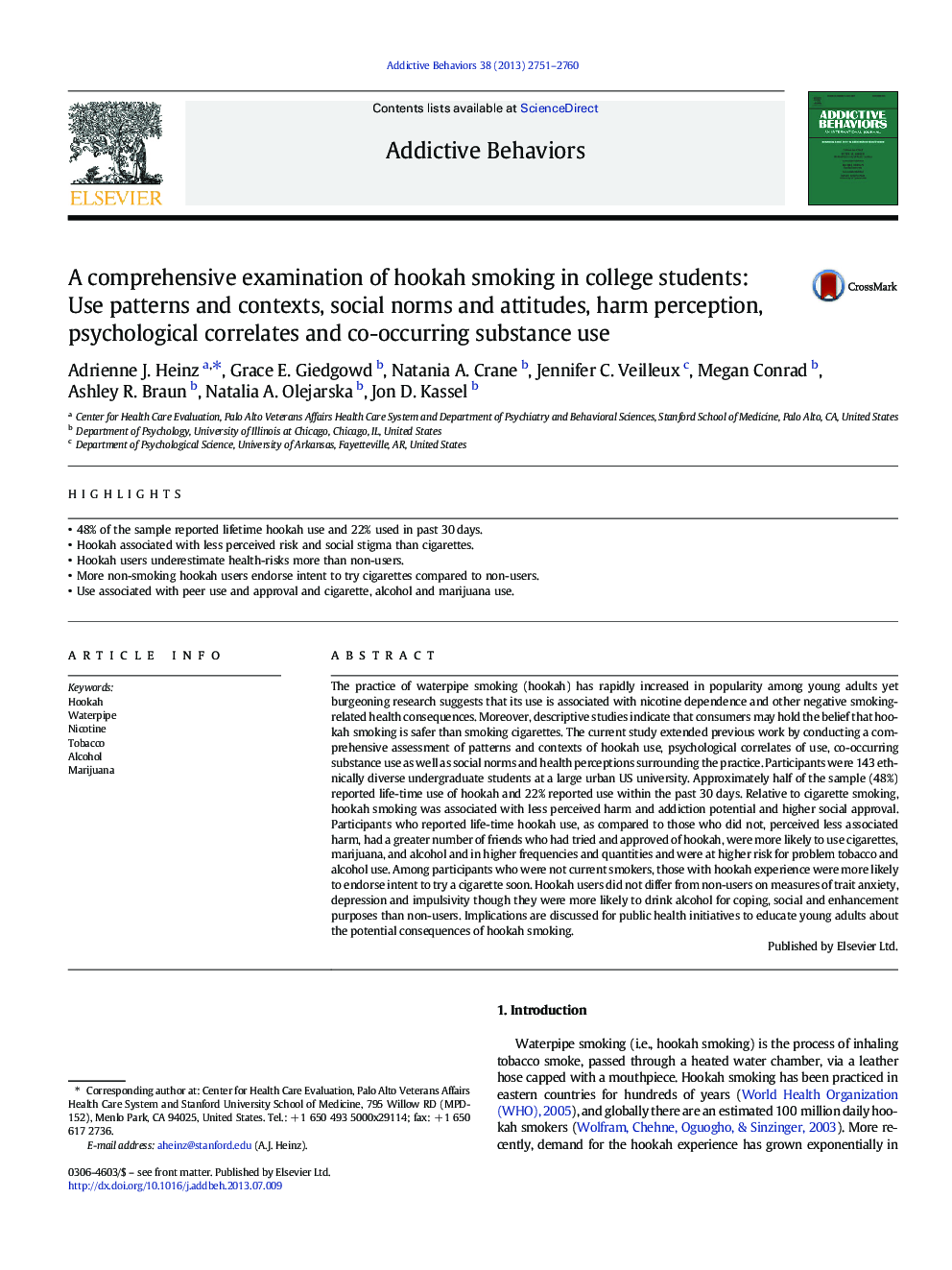| کد مقاله | کد نشریه | سال انتشار | مقاله انگلیسی | نسخه تمام متن |
|---|---|---|---|---|
| 10443385 | 915366 | 2013 | 10 صفحه PDF | دانلود رایگان |
عنوان انگلیسی مقاله ISI
A comprehensive examination of hookah smoking in college students: Use patterns and contexts, social norms and attitudes, harm perception, psychological correlates and co-occurring substance use
ترجمه فارسی عنوان
بررسی جامع سیگار کشیدن قلیان در دانشجویان: استفاده از الگوهای و زمینه ها، هنجارها و نگرش های اجتماعی، ادراک آسیب، همبستگی روانشناختی و مصرف مواد مخدر
دانلود مقاله + سفارش ترجمه
دانلود مقاله ISI انگلیسی
رایگان برای ایرانیان
کلمات کلیدی
قهوه، لوله آب، نیکوتین، توتون و تنباکو، الکل، ماریجوانا،
ترجمه چکیده
تمرین مصرف آب آشامیدنی (قلیان) به سرعت در میان جوانان افزایش یافته است، اما تحقیقات پیش رو نشان می دهد که استفاده از آن با وابستگی نیکوتین و سایر پیامدهای بهداشتی مرتبط با سیگار کشیدن همراه است. علاوه بر این، مطالعات توصیفی نشان می دهد که مصرف کنندگان ممکن است اعتقاد داشته باشند که سیگار کشیدن قلیان امن تر از سیگار کشیدن است. مطالعه حاضر کار قبلی را با انجام یک ارزیابی جامع از الگوها و زمینه های استفاده از قلیان، روابط مرتبط با استفاده، مصرف همزمان مواد و همچنین هنجارهای اجتماعی و ادراکات بهداشتی در اطراف این کار را بررسی کرد. شرکت کنندگان در 143 دانشجوی کارشناسی در مقطع قومی مختلف در یک دانشگاه بزرگ شهری ایالات متحده شرکت داشتند. تقریبا نیمی از نمونه (48٪) مصرف طول عمر قلیان را گزارش کرده اند و 22٪ از آنها در 30 روز گذشته گزارش شده است. نسبت به سیگار کشیدن سیگار کشیدن، مصرف سیگار کشیدن قلیان با آسیب پذیری کمتر و توان بالقوه اعتیاد و تایید اجتماعی بیشتر همراه بود. شرکت کنندگان که کلکسیون عمر خود را گزارش کردند، در مقایسه با کسانی که در معرض آسیب کمتری قرار نگرفته بودند، تعداد بیشتری از دوستان را که قلیان کشیدند و تایید کرده بودند، بیشتر از سیگار، ماری جوانا و الکل استفاده می کردند و بیشتر فرکانس ها و مقادیر و در معرض خطر بیشتر برای مشکل تنباکو و مصرف الکل بود. در میان شرکت کنندگان که سیگاریهای جاری نبودند، کسانی که با تجربه قلیان بودند، به احتمال زیاد قصد تایید سیگار را به زودی داشتند. کاربران کوهنوردی با افراد غیرمستقیم از اندازه گیری اضطراب، افسردگی و تکانشگری متفاوت نیستند، هرچند که احتمال بیشتری برای مصرف در مقابله با آنها، اهداف اجتماعی و پیشرفت بیشتری نسبت به غیرممکن است. تاثیرات برای ابتکارات بهداشت عمومی برای آموزش بزرگسالان جوان در مورد پیامدهای احتمالی سیگار کشیدن قلیان بحث شده است.
موضوعات مرتبط
علوم زیستی و بیوفناوری
علم عصب شناسی
علوم اعصاب رفتاری
چکیده انگلیسی
The practice of waterpipe smoking (hookah) has rapidly increased in popularity among young adults yet burgeoning research suggests that its use is associated with nicotine dependence and other negative smoking-related health consequences. Moreover, descriptive studies indicate that consumers may hold the belief that hookah smoking is safer than smoking cigarettes. The current study extended previous work by conducting a comprehensive assessment of patterns and contexts of hookah use, psychological correlates of use, co-occurring substance use as well as social norms and health perceptions surrounding the practice. Participants were 143 ethnically diverse undergraduate students at a large urban US university. Approximately half of the sample (48%) reported life-time use of hookah and 22% reported use within the past 30Â days. Relative to cigarette smoking, hookah smoking was associated with less perceived harm and addiction potential and higher social approval. Participants who reported life-time hookah use, as compared to those who did not, perceived less associated harm, had a greater number of friends who had tried and approved of hookah, were more likely to use cigarettes, marijuana, and alcohol and in higher frequencies and quantities and were at higher risk for problem tobacco and alcohol use. Among participants who were not current smokers, those with hookah experience were more likely to endorse intent to try a cigarette soon. Hookah users did not differ from non-users on measures of trait anxiety, depression and impulsivity though they were more likely to drink alcohol for coping, social and enhancement purposes than non-users. Implications are discussed for public health initiatives to educate young adults about the potential consequences of hookah smoking.
ناشر
Database: Elsevier - ScienceDirect (ساینس دایرکت)
Journal: Addictive Behaviors - Volume 38, Issue 11, November 2013, Pages 2751-2760
Journal: Addictive Behaviors - Volume 38, Issue 11, November 2013, Pages 2751-2760
نویسندگان
Adrienne J. Heinz, Grace E. Giedgowd, Natania A. Crane, Jennifer C. Veilleux, Megan Conrad, Ashley R. Braun, Natalia A. Olejarska, Jon D. Kassel,
